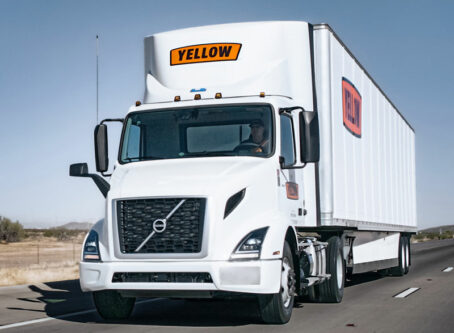You provide the power, they provide the trailers
Soon there may be big opportunities for small carriers and owner-operators at the expense of big trucking, dedicated fleets, and even some private carriers. It all depends on the success of trailer pools being deployed by two high-profile web-based brokers – Uber and Convoy. For their part, both Uber and Convoy could expand their reach deeper into big-time corporate logistics.
Uber just launched a new company called Powerloop. It’s a trailer leasing company that works with Uber Freight, the app-driven, web brokerage. The idea, according to Max Pike, strategy lead for Uber Freight, is to open the trailer-pool, drop-and-hook operations of big-time shippers to small carriers.
That kind of business has always belonged to the largest fleets, which aren’t always able to provide the power units shippers might require. The idea of access to thousands of qualified small carriers appeals to many big shippers.
“Owner-operators and smaller fleets tend not to have, say, 10 or 20 trailers to leave at one facility. They also don’t have the relationships with these large enterprise shippers. So to address the needs of both, we set up a new entity called Powerloop. Powerloop is owned by Uber, but is solely in the business of leasing trailers and then renting them to carriers,” Pike explained.
Uber Freight drops Powerloop trailers at shipper facilities where small carriers can provide power without having to own trailer fleets themselves. Shippers expand their access to capacity and pay less then big fleets charge for trailer pools.
Uber Freight says it will drop trailers at shipper locations, then rent them, loaded to ride, for $25 a day. The carrier provides power and pays only for the time it’s actually using the trailer. Uber expects to establish a network that will enable drivers to turn trips largely without having to load or unload at either end. Any qualified small carrier or owner-operator can be part of Uber’s power-only operation. Insurance and operating authority are required.
Uber currently operates Powerloop intrastate in Texas but plans to expand nationally. Power-only loads are not available on the Uber Freight app yet.
Meanwhile, Convoy, the Seattle-based startup backed by Amazon’s Jeff Bezos among other Big Tech stars, has a jump on Uber. Their trailer pool business was tested intrastate in California and has since expanded to other parts of the country. It is accessible through the Convoy app now.
“I think both approaches are trying to go after the same problems,” said Ziad Ismail, Convoy’s chief product officer when asked about the Uber trailer initiative.
Convoy also provides trailer pools for big shippers and power-only loads for small carriers. Convoy chose not to launch a separate company as Uber has done with Powerloop because they don’t rent trailers to their carriers. Instead, the cost of the trailer is “baked into” the rates charged to shippers, according to Ismail.
Convoy considered the trailer rental option, Ismail said. That would have passed at least some of the financial risk of leasing or buying trailers onto the carriers. “If a shipment is delayed, for example, the driver would be on the hook for the rental fee,” he explained.
Whether the Uber or Convoy approach pays more to carriers over time is not known.
Most of Convoy’s work is regional or local, Ismail said. That’s where the turns matter more. It’s better for drivers, he noted, than driving for most of a day, then spending four or five hours waiting and unloading.
Though neither Uber nor Convoy mentioned it, local and regional turns can also mean more home time.
Both Uber and Convoy’s trailer pool customers are mostly Fortune 500 companies, often in retail. Both cite Anheuser-Busch as an early and ongoing customer.
Will the drop-and-hook, trailer-pool idea work for other than the giant carriers that do it now?
“If Uber can make a profit and pay carriers enough to make a living doing drop and picks, that would be huge,” said Tom Heine, vice president at Descartes, a major logistics technology company.
Just like power units, trailers only make money when they move. Sitting in a yard, they lose money, he explained.
“Dropping a $25,000-$40,000 trailer and not having it move quickly is a disaster, unless you have so much money that it doesn’t matter. Maybe Uber can drop trailers for shippers where it was not previously economical. In any case, Uber’s challenge will be to move the trailers around with enough velocity to earn money,” Heine said.
What about those dedicated and private fleets?
“If there is a reliable Uber power-only fleet out there, I am sure it will be attractive to shippers,” Heine replied.
And small carriers?
“If they (Uber and Convoy) are truly moving carriers around a network, doing efficient round trips, and they pay the carriers enough to make a living, then small carriers and drivers will love it. It will do really well,” Heine concluded.









